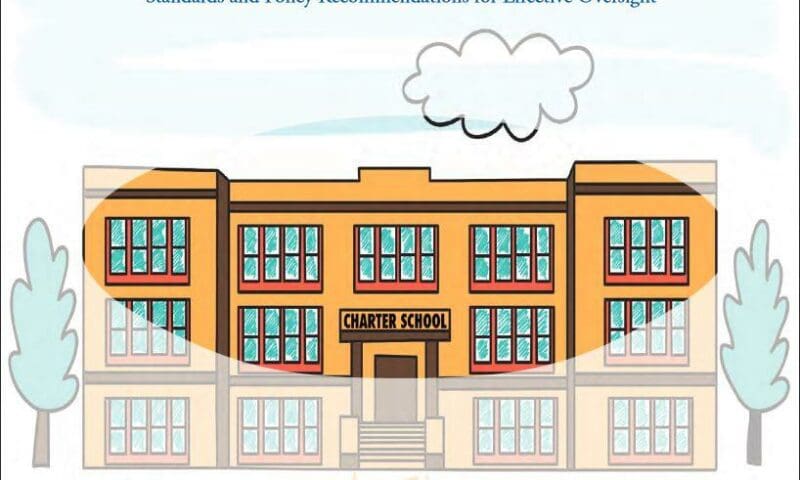

When charter schools first appeared in the ’90s, they aimed to experiment with innovative educational strategies to later implement in all public schools. Fast forward to today, when charters have grown into a national industry with 2.5 million students, 6,000 schools and a growing market of management services, vendors, policy shops and advocacy organizations – an industry that has its sights set on the nearly $750 billion spent each year on public education in the U.S.
A new report by the Annenberg Institute for School Reform, however, shows that state charter laws, regulations and oversight have not kept up with the rapid growth of charters. The lack of effective oversight has resulted in far too many cases of fraud and abuse, too little attention to equity, wasted taxpayer money and eroded public trust.
Far too many charters have been plagued by scandals, abuses and poor educational standards. For example,
» Read more about: Study Calls for New Charter School Standards »
Cashing in on Kids, a joint project of In the Public Interest and the American Federation of Teachers, is working to ensure that parents, teachers, students and taxpayers continue to have a strong voice in how we run our schools and educate our nation’s children. Below is an action that needs your attention.
The FBI is currently investigating Concept Schools, Inc., a charter management company, which operates 19 schools in the state of Ohio. The federal investigation is for “white-collar crime,” self-dealing, and misusing federal money meant for the neediest students.
Given the seriousness of the allegations, it is likely that all 19 Concept charter schools will be shut down, but too often this puts taxpayers on the hook for the schools’ liabilities and debts.
Can you sign our petition today and help us protect taxpayers from any more grief and costs created by Concept Schools?
» Read more about: Make Charters — Not Taxpayers — Pay for Closed Schools »
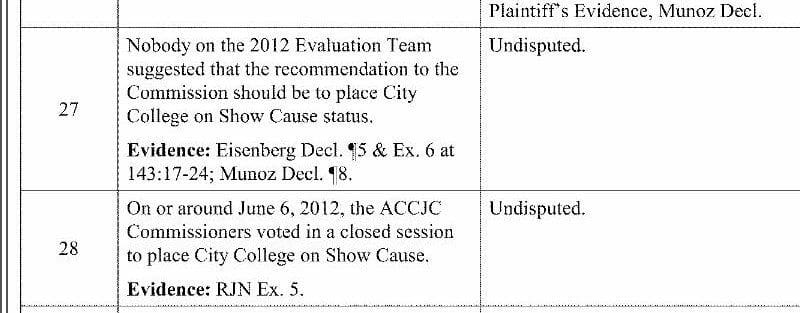
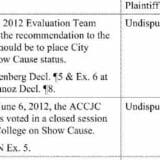
Throughout the two-year debate over a plan by the Accrediting Commission for Community and Junior Colleges (ACCJC) to shut down San Francisco’s nine-campus City College, the school’s supporters held their tongues on one key belief. Namely, that the commission had long ago made up its mind to shut down the college and no amount of restructuring could change the ACCJC’s mind. A recently filed court document, however, has confirmed this widespread suspicion.
The San Francisco Superior Court filing, first revealed in a Los Angeles Times story, disclosed that not one of the ACCJC’s own 15-member evaluation team ever suggested that CCSF’s accreditation be revoked; instead, the commission admitted, its panel merely recommended a form of academic probation that would allow the school to fix some administrative and accounting bugs in its system. Despite that, the ACCJC’s executive committee voted in 2012 to ignore the evaluators’ recommendations and threatened the school with the loss of its accreditation.
» Read more about: Fiasco: Attack on San Francisco City College Outrages CA Officials »


A controversy surrounding the Los Angeles Unified School District’s (LAUSD) compliance with California’s contentious Parent Trigger law has apparently opened up a rift between key allies responsible for passing the state’s so-called Parent Empowerment Act.
LAUSD’s decision to grant itself a year’s recess from the 2010 trigger law’s provisions came to light only last week when its author, former state Senator Gloria Romero, leaked a letter from an LAUSD lawyer claiming that, as part of a two-year waiver it received in 2013 from the federal Department of Education, the district is not subject to the Parent Trigger law through the 2014-2015 school year. The law allows parents to take over low-performing public schools and replace faculty with non-unionized teachers under the management of private charters.
That waiver, which was granted last November but only announced August 5 by U.S. Secretary of Education Arne Duncan, frees LAUSD and seven other state school districts from penalties connected to not meeting a 2014 deadline for 100 percent math and reading proficiency mandated by the George W.

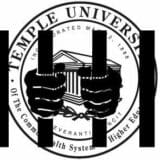
Whenever I hear something that sounds a little fishy, I always follow my mom’s advice to consider the source. So when two professors from Temple University touted a study praising the quality and cost effectiveness of private prisons, advocates wanted to know who funded it. Not surprisingly, it turned out that the private prison industry paid for the study, a fact conveniently missing from the professors’ early draft and media appearances.
In the Public Interest’s friend and colleague Alex Friedmann, managing editor of the monthly Prison Legal News and associate director of the Human Rights Defense Center, filed an ethics complaint with Temple University. In addition, ITPI and 15 other organizations demanded that Temple conduct an ethics review.
In response, Temple University has disassociated itself from the study. In addition, the methodology behind the study has also been called out for being misleading and its conclusions for being inaccurate.


America’s education system is unequal and unfair. Students who live in wealthy communities have huge advantages that rig the system in their favor. They have more experienced teachers and a much lower student-teacher ratio. They have more modern facilities, more up-to-date computer and science equipment and more up-to-date textbooks. They have more elective courses, more music and art offerings and more extracurricular programs. They have better libraries, more guidance counselors and superior athletic facilities.
Not surprisingly, affluent students in well-off school districts have higher rates of high school graduation, college attendance and entry to the more selective colleges. This has little to do with intelligence or ability. For example, 82 percent of affluent students who had SAT scores over 1200 graduate from college. In contrast, only 44 percent of low-income students with the same high SAT scores graduate from college. This wide gap can’t be explained by differences in motivation or smarts.
» Read more about: California’s Public Schools: Separate and Definitely Unequal »


As a nation we often talk about the importance of educating our children, but sometimes we talk the talk more than we walk the walk. In Michigan, a year-long investigation conducted by the Detroit Free Press showed that Michigan taxpayers pour nearly $1 billion a year into charter schools but fail to hold the schools accountable.
The investigation found that the lack of oversight allowed charter schools to cheat students out of a good education. The Free Press found “wasteful spending, conflicts of interest, poor performing schools and a failure to close the worst of the worst.”
In Michigan, specifically, the Free Press reports:


Technology is radically transforming the ways we work and the ways we learn, nowhere more so than in the world of online education. But will the shape of the future be drawn solely by corporate leaders in the technology industry, or will parents, students and teachers have a voice in what tomorrow’s digital classroom looks like?
As the online education sector grows, the public’s stake in that question becomes ever more paramount. One way in which virtual teachers are seeking to ensure that the pursuit of profits does not come at the expense of students, parents and educators is by organizing to join the California Teachers Association. (Disclosure: CTA is a financial supporter of Capital & Main).
Below is the first in our series of posts written by teachers at the California Virtual Academies (CAVA), an affiliate of K12, a for-profit,
» Read more about: Lesson Plan: Protecting Students In Online Schools »


On Tuesday a coalition of faculty, legislators, staff and students (pictured above) marched to Governor Jerry Brown’s office in support of greatly increased funding for the California State University system. Governor Brown’s budget for the 2014-2015 fiscal year includes $142.2 million for the beleaguered CSU system, a five percent increase in its budget. Kevin Wehr, a sociology professor at CSU Sacramento and one of the marchers, said that “the governor’s proposal is welcome but it’s not nearly enough. [The cuts to the CSU budget] were massive, deep and really hurt the ability to deliver a quality public education.”
During the recession, many state programs were hit hard by budget cuts. However, the economic downturn took a particularly devastating toll on the state university system. More than a billion dollars was slashed from its budget as California dealt with the recession. Only a small fraction has since been restored.
The CSU system faces numerous problems.
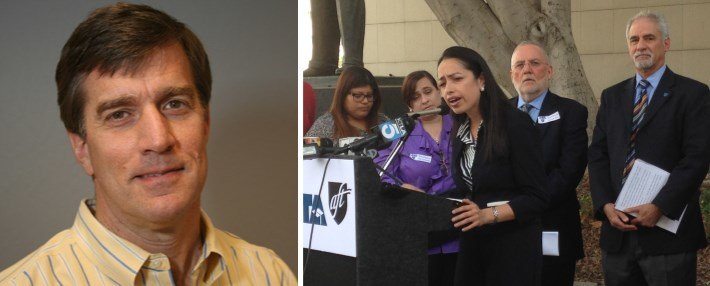

Reagan Duncan has taught a combined kindergarten-first grade class in Vista for 10 years. When she heard about Tuesday’s ruling in the Vergara v. California trial, she feared the worst. The case’s plaintiffs sought to throw out the state’s job protections for its teachers on the grounds that the safeguards make it impossible to dismiss “grossly ineffective” teachers.
“My first thought,” Duncan told Capital & Main, “was that it’s going to make it harder for well-run school districts to operate classes for our students – and worse for poorly run districts. The laws in place for dealing with teachers who struggle in the classroom have been working. I’ve seen teachers let go – it’s just not true that they never are.”
The bench trial, which began January 27 and unfolded over 10 weeks, was funded by Students Matter on behalf of nine public school students who claim that California’s policies violate the civil rights of students – particularly those of low-income and minority students – by denying them a quality education.
» Read more about: Aftermath: What the Vergara Decision Means »
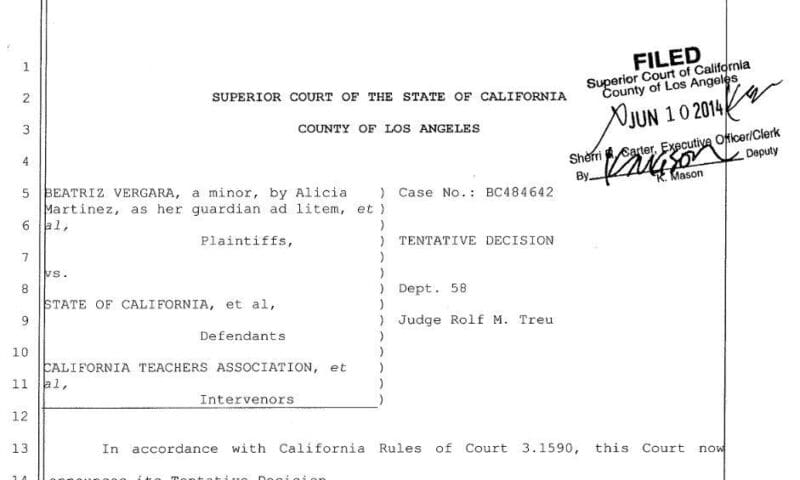

A Los Angeles judge ruled today that California’s public school teacher job protections are unconstitutional. The ruling, issued as a tentative decision, was immediately stayed by the Superior Court Judge, Rolf Treu, pending appeal.
The potentially far-reaching case, Vergara v. California, was brought on behalf of nine schoolchildren, who claimed the retention of “grossly ineffective” teachers through five due-process statutes violated their civil rights. They were organized by Students Matter, a Menlo Park nonprofit created by Silicon Valley entrepreneur David Welch, who had hired the white shoe law firm Gibson Dunn & Crutcher to represent the nine at the bench trial before Judge Treu.
Treu, appointed by Republican Governor Pete Wilson in 1995, found “that both students and teachers are unfairly, unnecessarily, and for no legally cognizable reason – let alone a compelling one – disadvantaged by the current permanent employment statute.”


The commission charged with accrediting California’s two-year community colleges convened its three-day semiannual meeting in Sacramento yesterday morning. Conspicuously absent from the public agenda, however, is any mention of the action that has brought down an unprecedented firestorm of controversy onto the publicity-shy agency — its disaccreditation of the state’s largest community college.
At least the Accrediting Commission for Community and Junior Colleges (ACCJC) hasn’t included the fate of City College of San Francisco (CCSF) on its schedule for Friday’s public portion of the meeting. What’s on the program for the first two days — the sessions when the agency makes its substantive findings and decisions — is anyone’s guess. That part of the meeting is conducted in secret.
What is now certain is that no 11th-hour reprieve from the school’s approaching date with de-accreditation will be forthcoming. Supporters of the embattled college had been holding out hope that the commission would use the meeting to announce an extension to the July 31 termination deadline it set for the school’s accreditation during last June’s secret sessions.


For those with Internet access, free online classes from Ivy League universities, taught by some of the world’s top professors, are just a click away. But to a grassroots coalition of organizations representing hundreds of thousands of college and university educators, there’s a reason this promise seems too good to be true.
The Campaign for the Future of Higher Education (CFHE), comprised of the California Faculty Association (a financial supporter of Capital & Main), the National Education Association, the California Community College Association and the American Federation of Teachers, along with dozens of other education and labor groups, is urging the public to not believe the hype. The CFHE is also asking the top three promoters of massive open online courses, commonly known as MOOCs, to tone down their claims and come clean about their main goal – to make a profit.
Online courses have been available since the1990s,


Twice a year Sacramento goes into a frenzy analyzing the state budget. First, in January, the Governor releases his proposed budget, then the “May Revise” appears as the Governor adjusts projections and heeds advice from Senators and Assembly members. The budget, however, is more than a long economic document. It becomes part of the Governor’s legacy, it’s a statement of his priorities, how he will want to be remembered and what he believes will be best for Californians.
Governor Jerry Brown is shaping a legacy based on fiscal responsibility. He wants to be remembered as the Governor who solved the debt crisis and bequeathed fiscal stability to California. Unlike his predecessor, Governor Brown has invested in education, by creating a solvent K-12 system and reinvesting, albeit modestly, in public higher education. However, he is missing some crucial elements that will undermine this success: namely, an investment in low-income families. The Governor forgot that it is working families who most need fiscal solvency.
» Read more about: Working Families Need a Better May Revise »


Charter schools that receive public money should be held to the same standards as traditional public schools. That’s just common sense.
Unfortunately, many charter schools throughout the country don’t provide all students equitable access, and aren’t transparent and accountable when it comes to public funds.
The House Rules Committee has the opportunity to ensure that a major bill being voted on this week in Congress—H.R. 10, the Success and Opportunity through Quality Charter Schools Act—would require that public charters meet high standards of equitable access, accountability and transparency. To do that, the Rules Committee needs to allow several important amendments to H.R. 10 to come to the floor for a vote. These amendments will help reclaim the promise of public education and require publicly funded schools to operate with integrity.
» Read more about: Congress Weighs Charter School Accountability »


Large corporate lobbies have, in recent years, accelerated their push to expand private charter schools. America spends nearly three quarters of a trillion dollars on public education annually and companies such as “cyber-charter” giant, K12 Inc., Rupert Murdoch’s Amplify and Rocketship, a darling of the venture capital industry, see a pot of gold.
A new report by In the Public Interest Scholar Network member Gordon Lafer, for the Economic Policy Institute, examines recent proposals by Wisconsin state legislators to privatize schools, particularly in Milwaukee, and finds that the proposals won’t help poor kids.
How? The proposals call for public schools in the largest and poorest school district to be replaced with private charter schools that substitute online apps for teachers for a significant part of the day. This “blended learning” model primarily focuses on math, literacy and test preparation, while paying minimal attention to other subjects. Also, money earmarked for Milwaukee students is diverted to fund the company’s ambitious growth plans in other cities.
» Read more about: Privatized Education’s Smoke and Mirrors »
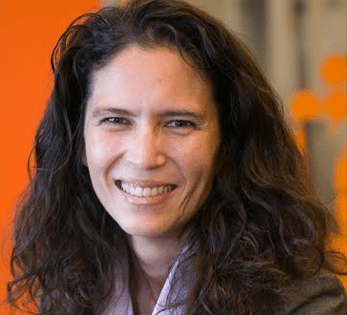

Nina Revoyr is the author of four acclaimed novels, including Southland, The Age of Dreaming and Wingshooters. She is also executive vice president of Children’s Institute in Los Angeles and has taught at Pitzer and Occidental colleges, and at Antioch and Cornell universities. Revoyr will be this year’s keynote speaker at the Los Angeles Alliance for a New Economy’s Women for a New Los Angeles Luncheon on May 9. We recently spoke to her about her work and Los Angeles’ place in it.
[divider]
Your first novel, A Necessary Hunger, dealt with two young girls on the cusp of adulthood. What are the particular challenges young people of color face growing up in Los Angeles today?
» Read more about: Trauma and Vision: An Interview With Novelist Nina Revoyr »


You’d think that that public television would support public education, but you’d be wrong. The Public Broadcasting System (PBS) has gotten in bed with the billionaires and conservatives who want to privatize our public schools. PBS has nary a word to say about the big money — from folks like the Walton family (Walmart), Microsoft founder Bill Gates, Eli Broad, business titan and former New York mayor Michael Bloomberg, media mogul Rupert Murdoch, Joel Klein (former NYC schools chancellor and now a Murdoch employee), and their ilk — that has been funding the attack on public schools and teachers unions. They’ve donated big bucks to advocacy groups, think tanks, and candidates for school boards who echo their party line.
PBS and its local stations have fallen all over themselves to promote Waiting for Superman, a documentary film that could easily been mistaken for a commercial on behalf of charter schools.


Like thousands of family child care providers across Los Angeles County, Ramona Duran’s day begins at a frantic pace. While most Angelenos are still asleep, Ramona is up before sunrise preparing for the first family to arrive at 5 a.m. at the Long Beach day care center she operates. She checks on the status of a healthy breakfast cooking in the kitchen and makes some last minute arrangements of the play area. Ramona’s Day Care is not a baby-sitting service; it is the center of her community and a labor of love. What she loves most is taking care of the “little ones” and helping families.
“I help the family to go to school, to go to work [and] go to the doctor,” Ramona says. She truly enables families to thrive.
Unfortunately, thousands of women who serve our youngest and most at-risk children struggle to make ends meet — family child care providers earn less than $20,000 per year.


Today in Los Angeles attorneys will offer closing arguments in Vergara v. California, a lawsuit funded by Silicon Valley millionaire David Welch and others with ties to the school privatization movement under the banner of a front organization called Students Matter. The suit wrongly attacks as unconstitutional California statutes covering teacher employment, including the current two-year probationary period, the due process protections built into teacher dismissal and layoff procedures that value experience over more arbitrary factors.
That the probationary period is even an issue is a little mind-boggling; if a principal can have a teacher on staff for two years and still have no idea if that teacher is effective, he or she probably has no business being a principal. At trial, award-winning superintendents and principals have testified that two years is more than enough time to decide whether to keep a teacher on staff and,
» Read more about: Vergara Lawsuit Would Hurt California Students »